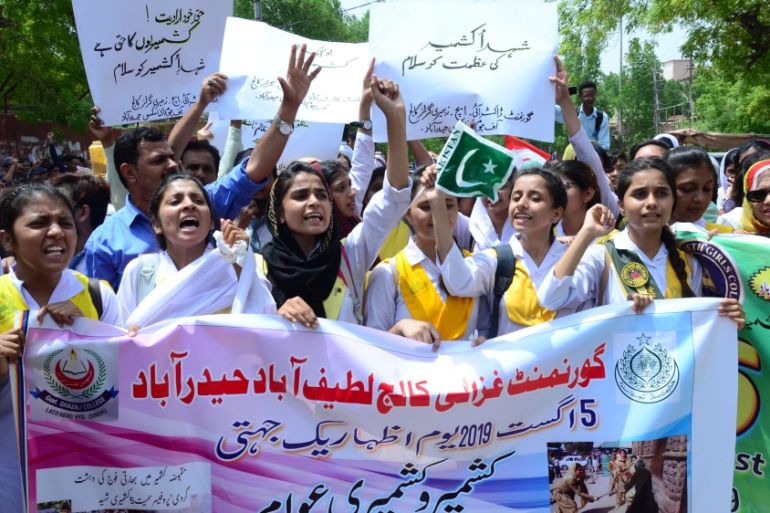‘Darkest day’: Uproar as India strips Kashmir of special status
Indian opposition, Kashmiri leaders and activists condemn government’s decision to scrap Article 370 of constitution.

The Indian government’s decision to abolish a special status for India-administered Kashmir has been widely criticised and opposed, as tensions prevail over the constitutional autonomy of the disputed region.
Monday’s announcement sparked chaotic scenes in parliament, with opposition politicians condemning the presidential decree revoking Article 370 of the constitution that gives the state of Jammu and Kashmir a substantial degree of autonomy.
The government led by the Hindu nationalist Bharatiya Janata Party (BJP) also moved a bill proposing the Jammu and Kashmir state be divided into two “union territories” directly ruled by New Delhi.
The main opposition Congress party described the decision as a “catastrophic step”.
“Shameful that you have turned Jammu and Kashmir into a non-entity,” said Ghulam Nabi Azad, a Congress parliamentarian who comes from India-administered Kashmir.
One legislator from Kashmir-based Peoples Democratic Party tore up a copy of the Indian constitution before being reportedly removed from the chambers by parliamentary marshals.
Article 370 of the constitution forbid Indians outside the state from permanently settling, buying land, holding local government jobs and securing education scholarships.
The decree, which was issued hours after imposing a major security clampdown in the disputed region, said the measure came into force “at once”.
‘Total betrayal of trust’
Political leaders in India-administered Kashmir, including former chief ministers Mehbooba Mufti and Omar Abdullah who have been placed under house arrest, also criticised the decision.
“The Indian government’s unilateral and shocking decisions today are a total betrayal of trust that the people of Jammu and Kashmir had reposed in India when the state acceded to it in 1947,” Abdullah said in a statement.
The decree, which he called an “aggression”, will have “far-reaching and dangerous consequences,” said Abdullah. “A long and tough battle lies ahead. We are ready for that.”
Mufti tweeted that the latest move was the “darkest day in Indian democracy”.
“Unilateral decision of GOI [government of India] to scrap Article 370 is illegal and unconstitutional which will make India an occupational force in J&K [Jammu and Kashmir],” she posted.
Today the people of Jammu & Kashmir who reposed their faith in institutions of India like parliament & Supreme Court feel defeated & betrayed. By dismembering the state & fraudulently taking away what is rightfully & legally ours, they have further complicated the Kashmir dispute
— Mehbooba Mufti (@MehboobaMufti) August 5, 2019
However, BJP politicians and right-wing allies welcomed the decision and congratulated Modi, who had proposed to abrogate Article 370 in his election campaign.
This is a moment of pride as the NDA. Big congratulations to @PMOIndia @narendramodi ji, Home Minister @AmitShah ji, the Parliament & the Citizens of India. This is exactly why we supported the NDA in Lok Sabha 2019 led by Modi ji. Decision for India and the State of J&K.
— Aaditya Thackeray (@AUThackeray) August 5, 2019
Protests in Pakistan
The announcement came amid heightened tensions along the Line of Control – the highly militarised defacto border that divides Kashmir between India and Pakistan.
On Sunday, parts of India-administered Kashmir were placed under lockdown, with some internet and phone services cut off.
Pakistan, which has fought two of its three wars against India over the disputed territory, strongly condemned India’s move and vowed to “exercise all possible options to counter the illegal steps”.
“No unilateral step by the Government of India can change this disputed status, as enshrined in the United Nations Security Council [UNSC] resolutions. Nor will this ever be acceptable to the people of Jammu and Kashmir and Pakistan,” Pakistan’s foreign ministry said in a statement.
Meanwhile, hundreds of Kashmiri activists staged a demonstration near the Indian embassy in the Pakistani capital, Islamabad, on Monday, holding placards and chanting slogans.
Similar rallies were also staged in other cities, including Hyderabad and Karachi.
“This revocation of these two articles means any Indian citizen will be able to grab land in occupied Kashmir, he can be a citizen of Kashmir,” Nabi Baig, a refugee from Kashmir, told the Associated Press news agency.